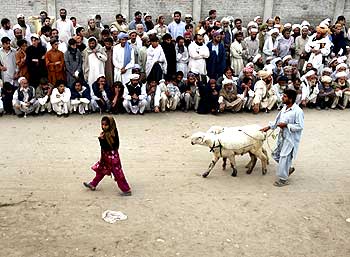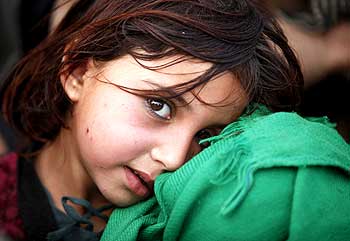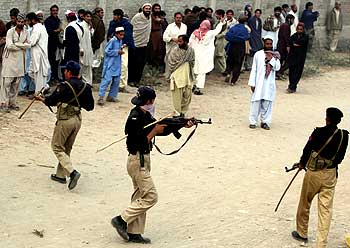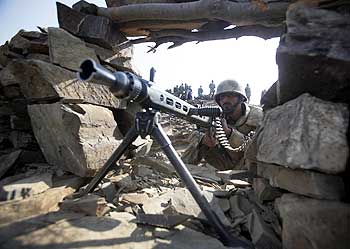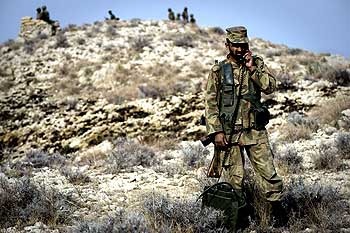 | « Back to article | Print this article |
It's a propaganda war in South Waziristan
Does India have a role in restive South Waziristan?
Most experts in Pakistan feel talk about India's alleged role in the trouble-torn area is part of a propaganda war being conducted by the Pakistan army, which is feeling the heat in its battle against the Hakimullah Mehsud-led Tehrik Taliban Pakistan.
Many analysts say the Pakistani forces are resorting to the propaganda war through government-run media -- planting news items like 'Indian arms and ammunition, literature, medical equipment have been recovered from Sherwangi near Kaniguram during search and combing operations' -- to crush the Taliban's image across the country.
Rahimullah Yousafzai, the respected expert on Afghanistan and Pashtun affairs, told rediff.com, "Pakistan claims it has recovered Indian weaponry and medicines from South Waziristan. But I don't believe such reports. There are no such links between India and the Taliban. Even if India supports militancy, it is not foolish enough to leave the evidence."
'Pakistanis prefer Indian medicine'
"So if medicines are recovered from Waziristan, one cannot say that it is assistance from Indians to the Taliban," says Rahimullah Yousafzai.
"Pakistan," Yousafzai points out, "says there is concrete evidence but India does not agree. Let a third party decide the matter. Instead of the blame game, the issue should be raised at high-level meetings between the two countries."
Discussing the alleged Indian hand in the trouble-torn region, Syed Saleem Shahzad, chief of bureau, Asia Times Online, says, "Having interacted with militants in tribal areas, I can confirm that the Indian involvement is not possible in such areas."
"In fact," Shahzad adds, "after the Mumbai terror attacks last year, senior Pakistani security officials described Baitullah Mehsud and Mullah Fazlullah as Pakistan's assets while briefing foreign journalists. That was published in all the national newspapers. Hence, calling those militants Indian agents is just propaganda, which is essential during such military operations."
Another propaganda war in S Waziristan
Not buying the argument, Syed Saleem Shahzad says, "If that happens, that group will immediately be isolated from the main Taliban. The United States tried that experiment many times and each time it failed."
Asked if the anti-India propaganda campaign in South Waziristan is a ploy to divert attention from the Mumbai attacks, Shahzad adds, "This is simply an exercise to motivate their men to fight against militants. The Pakistan army is trained to fight against India. Only now are they being asked to fight an enemy which was previously its ally."
'It will boost Taliban's image'
"If the Pakistan army has concrete evidence of India's involvement in terrorist attacks in Waziristan, then the matter should be taken up at the highest level," she says.
"Claims about India's involvement are aimed at boosting the Taliban's overall image in Pakistan," Dr Siddiqa adds. "Such news will convey the impression that the Taliban is not behind the violence. This is indeed a good public relations exercise. It is also a signal from the Pakistan army to the Taliban that while Islamabad will fight forces which want to damage the Pakistani State, it is not generally against the Taliban."
The war goes on
However, sources tracking the Taliban indicate, "The militants are actually withdrawing from some key areas as part of their strategy. In fact, it is a trap -- letting the army in and then beginning a guerilla war."
